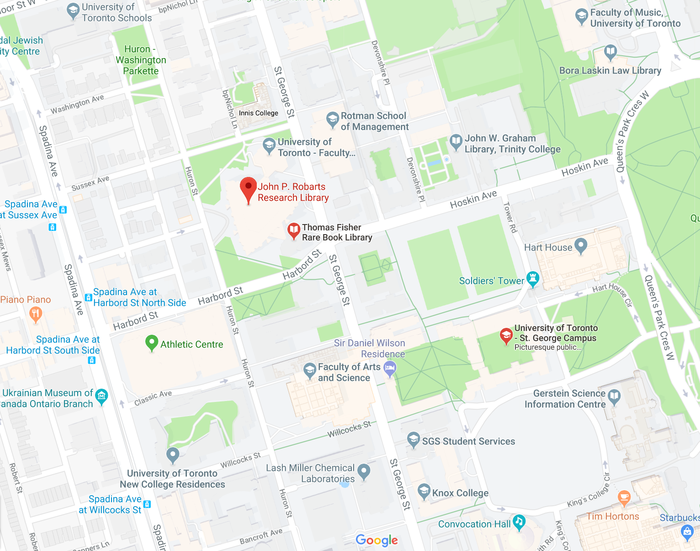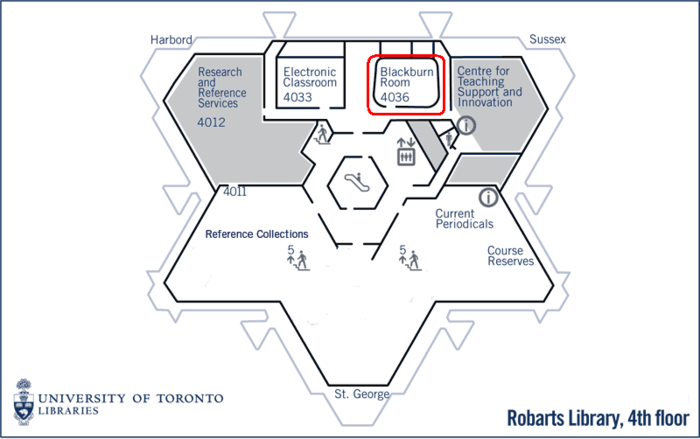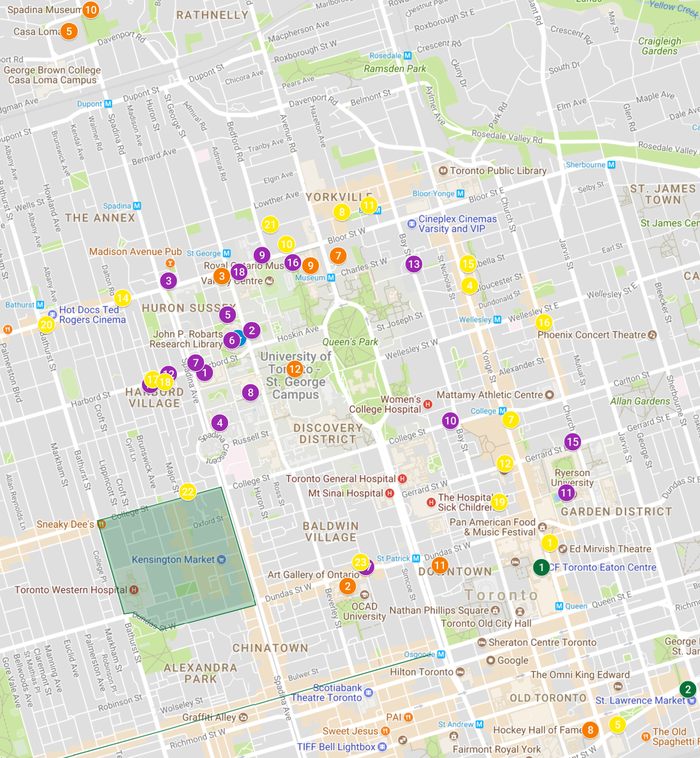AtoM Camp Toronto 2018
Main Page > Community > Community/Camps > UofT2018
We're excited to announce our third AtoM Camp, cohosted by the University of Toronto and Artefactual! Inspired by similar events like Hydra Camp, Islandora Camp and Fedora Camp, AtoM Camp is intended to provide a space for anyone interested in or currently using AtoM to come together, learn about the platform from other users, and share their experiences.
Contents
Dates & Location
August 29th - 31st, 2018 - John P. Robarts Research Library at the University of Toronto
130 St George St, Toronto, ON M5S 1A5, Canada
Room: Blackburn - 4th floor, room 4036
The Robarts Library is located in downtown Toronto (just north of the downtown core), on the University of Toronto's St. George Campus, bordered by Harbord Village, Yorkville, the Annex, and the Discovery District. It is about a 5 minute walk from the St. George subway station, and is within easy walking distance of many hotels and restaurants. Queen's Park is only a few minutes away by foot.
Accessibility
The Robarts building is wheelchair accessible and includes both escalators and elevators inside. The primary accessible entrance to the building is the main entrance facing St. George street. For more detailed accessibility information, you can contact UoT's Accessibility Services.
If you require any other disability accommodation, physical or otherwise, please let us know by email at info@artefactual.com.
Click image for details on the Blackburn room
Territorial Acknowledgement
The land on which we will gather is the traditional territory of the Haudenosaunee, Anishnawbe, and Wendat (Huron) Indigenous Peoples and most recently, the territory of the Mississaugas of the New Credit First Nation. The territory was the subject of the Dish With One Spoon Wampum Belt Covenant, an agreement between the Iroquois Confederacy and the Ojibwe and allied nations to peaceably share and care for the resources around the Great Lakes.
The territory that is now known as Toronto has a rich history that extends thousands of years before European settlers arrived. The word “Toronto” itself, originates from the Kanienke’haka word "Tkaronto" which translates to, "the place in the water where the trees are standing." Today, Toronto is still the home to many Indigenous people from across Turtle Island and we are grateful to have the opportunity to work and present in this territory.
We are also mindful of broken covenants and the need to strive to make right with all our relations - particularly by addressing the Calls to Action outlined by the Truth and Reconciliation Commission of Canada as they relate to our profession.
Getting to Toronto
Flying into Toronto
Pearson International Airport
If you are flying into Pearson International Airport, there are numerous ways to get into the city:
The Union-Pearson Express train ($12.35 one-way) runs between the airport and Union Station. Once at Union, transfer to Line 1 (Yonge-University) (aka the Yellow line), headed north towards Vaughan Metropolitan Centre Station. You will want to travel about 6 stops, to St. George station. From there, it is a 5-6 minute walk to Robarts (use the St. George Street exit when leaving the station).
There are also several TTC ($3.25) bus routes available from Pearson Airport:
- 192 Airport Rocket — this bus takes you to Kipling subway station. From Kipling, take the subway eastbound to St. George subway station.
- 58A Malton — this bus takes you to Lawrence West subway station. From Lawrence West, travel southbound to St. George subway station.
Billy Bishop/Toronto Island Airport (Porter Airlines)
If you are flying Porter Airlines and decide to take public transit from the Toronto Island Airport
- Catch the Porter shuttle, which will drop you off at to the north-east corner of Front Street and York Street.
- Cross to the south side of Front Street and enter Union subway station.
- Take the University-Spadina line subway northbound to St. George subway station.
Taking the train or bus to Toronto
VIA Rail
VIA Rail trains arrive at Toronto’s Union Station. You can connect to the TTC here and it is a short subway ride up to St. George station / UofT
GO Transit (GTA)
A number of GO bus and train routes arrive at Union Station. You can connect to the TTC there and it is a short subway ride up to St. George station / UofT.
Greyhound and/or Megabus
Both Greyhound and Megabus trips end their journey in Toronto at the Toronto Coach Terminal. The Toronto Coach Terminal is located at 610 Bay Street, near St. Patrick station. You can either take the TTC from St. Patrick to St. George station, or enjoy a short walk (30 mins) to Robarts Library.
Getting to UofT's Robarts Library
Transit
- The Library is a 6-minute walk from St. George subway station (take the St. George Street exit).
- The 94 bus stops at the corners of Hoskin/Harbord and St. George, across the street from the library.
- The 510 Spadina streetcar is a 3-minute walk away (Harbord Street stop).
Parking
- The closest garages to Robarts Library are underneath the Rotman Management Building or at the Graduate House garage. Both are a short walk to the library.
Registration
Registration is now open!
- $375 CAD to attend all 3 days of Camp
- We have a limited amount of one-day tickets available as well, for $150 CAD
Register here:
Camp Counselors
At all of the camps that Artefactual hosts, we seek to provide attendees with counselors who have a wide range of experience with the software. Supplementing members of the Artefactual crew will be counselors who have extensive experience with AtoM as users and administrators.
Amanda Hill
Amanda Hill is the Archivist for the Community Archives of Belleville and Hastings County in Belleville, Ontario. She has been involved with online description of archives since 2001. She managed the Archives Association of Ontario’s Archeion service between 2009 and 2015, overseeing the introduction of AtoM for the site and its 150 contributing institutions. In 2016 she set up Discover, a hosted instance of AtoM for the Community Archives.
Dan Gillean
Dan serves as AtoM Program Manager and provides quality assurance testing, requirements analysis, documentation, technical support and community dialogue for Artefactual’s AtoM and Archivematica projects.
Sara Allain
Sara started working at Artefactual on both the AtoM and Archivematica projects in 2016, providing requirements analysis, user documentation, QA testing and community support. Prior to her work at Artefactual Sara worked in academic libraries as - depending on the day - an archivist and/or a librarian, tackling wide-ranging subjects like data migration, Islandora implementation, digitization management, and library communications. She firmly believes that the best way to learn is to dive in headfirst - because there probably aren't any sharks in the water. Right?
Steve Breker
Steve joined the Artefactual team in 2016 as an AtoM programmer and is responsible for implementing a broad range of AtoM programming tasks and providing AtoM technical support. Steve can sometimes be seen lurking in the AtoM-users forum providing technical support.
Schedule
The schedule is a work in progress. Depending on the make-up of the campers, sessions might range from AtoM 101 for absolute beginners to command line tools to systems administration. We look forward to welcoming campers with a wide range of experience with AtoM!
Tip
If you'd like to get an idea of what to expect, why not take a look at the schedule from our previous Camps? Jump to:
Potential topics
The registration form allows campers to select some topics of interest from a pre-set list, which includes topics that we think will be of interest:
- AtoM 101 - beginner's guide to AtoM (or a helpful refresher if it's been a while!)
- Importing and exporting archival descriptions using CSV templates.
- Performing common tasks on the command line (importing, updating records, etc.).
- Customizing the front end through the web interface (menus, static pages, etc.).
- Maintenance and troubleshooting (sysadmins).
- Maintenance and troubleshooting (front-end users).
- Creating custom AtoM themes.
- Installation and deployment.
- Developing new features.
- Contributing to the AtoM documentation.
- Future of AtoM and/or project governance.
Is there something you think we're missing from the list? When you register, there will be a field to suggest any other topics you want us to cover. If there's a critical mass of people who want to discuss a particular topic, we'll cover it! During the camp, we'll also leave lots of space to adjust the schedule to give time to specific topics as they come up.
Accommodation and Things to Do
There are a number of hotels, B&B’s and hostels within walking distance of the University of Toronto to choose from:
- Kimpton Saint George (280 Bloor St. W)
- Chelsea Hotel (33 Gerrard St. W.)
- Marriott Courtyard Toronto Downtown (475 Yonge St)
- Ramada Plaza Toronto (300 Jarvis St)
- Bond Place Hotel Toronto (65 Dundas St E)
- The Anndore House hotel (15 Charles St. E)
- Planet Traveler Hostel (357 College St.)
- Annex Garden B&B (445 Euclid Ave)
- Beverley Place B&B (226 Beverley St)
- Baldwin Village Inn (9 Baldwin St)
- Madison Manor Boutique Hotel (20 Madison Avenue)
- Spadina 11 Guesthouse (11 Spadina Road)
Food, Drink, and Things to do in Toronto
Food options adjacent to Robarts include:
- University of Toronto campus food map
- There are also a number of food trucks outside the Library along St. George Street
The Local Arrangements team has also put together a map featuring a number of restaurants and other local things to do while in Toronto!
Want even more suggestions? See what these various guides have to say:
- Things to do in Toronto (TripAdvisor)
- 20 best things to do in Toronto (TimeOut Toronto)
- Top things to do in Toronto (Expedia Travel Guides)
- Toronto's best bars (USA Today 10 Best)
- Best bars in Toronto (NOW Magazine)
Code of Conduct
The AtoM community is dedicated to providing a welcoming and positive experience for everyone, whether they are in a formal session or a social setting related to an AtoM event, or are taking part in activities online. AtoM community participants come from all over the world and bring with them a wide variety of professional, personal and social backgrounds; whatever these may be, we treat colleagues with dignity and respect. We are sensitive to the fact that the international nature of the AtoM community means that we span many different social norms around language and behaviour and we strive to conduct ourselves in ways that are unlikely to cause offense. In the event that someone’s conduct is causing offense or distress, the AtoM Camp has a detailed Anti-Harassment Policy, details below, which can be applied to address the problem.
The first step in dealing with any serious misconduct is to contact a member of the organizing group, or a counsellor at an AtoM Camp (please see counsellors, below). These people will be made known before and during any AtoM Camp event.
Anti-Harassment Policy
The AtoM community is dedicated to providing a harassment-free conference/camp experience for everyone. If you have been harassed, please consult this protocol for conflict resolution which makes clear how we can help.
The AtoM community has established the following policy to make it clear that we do not tolerate harassment in any form. Sexual or discriminatory language and imagery are not appropriate for any event venue, including talks, or any other communication channel used during the conference (such as social media).
Harassment includes:
- offensive verbal comments related to sex, gender, ethnicity, nationality, socioeconomic status, sexual orientation, disability, physical appearance, body size, age, race, religion;
- sexual or discriminatory images in public spaces;
- deliberate intimidation;
- stalking;
- harassing photography or recording;
- sustained disruption of talks or other events;
- inappropriate physical contact; and
- unwelcome sexual attention.
The lingua franca of AtoM Camp is English; however, English may not be the native language of AtoM Camp participants. Further, cultural norms around what may be considered obscene and offensive communication will vary among AtoM Camp attendees. Campers are asked to please be mindful of the international character of AtoM Camp, and to use respectful and clear language free of slang to facilitate communication.
Participants asked to stop any harassing behavior are expected to comply immediately.
If a participant engages in harassing behavior, event organizers and AtoM representatives (or their designees) may take any action they deem appropriate, including warning the offender, expulsion from the AtoM Camp, or contacting a higher authority such as a representative from the offender’s institution.
If a participant raises a concern relating to actions covered by this policy in good faith, there will be no retaliation for bringing forward their concern. Threatening or taking action against someone for invoking this policy or for participating in any related investigation will be considered a violation of this policy.
Participants are expected to follow the anti-harassment policy at all Camp-related venues, Camp-related social events, and online communication channels
We expect attendees and speakers past and present to be respectful to each other, and we will deal with any incidents that arise, including on social media.
We value your participation in the AtoM community and your support in keeping the AtoM community a safe, welcoming, and friendly space for fellow participants.
Acknowledgments
This policy is based on the PASIG Code of Conduct, portions of which were modified from the Open Repositories’ code of conduct, which was itself modified from Seattle Attic’s code of conduct and the Ada Initiative’s event harassment policy.
License
This document is licensed under Creative Commons BY-SA.




